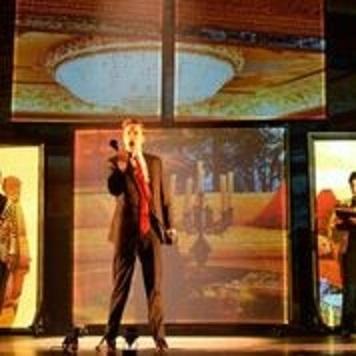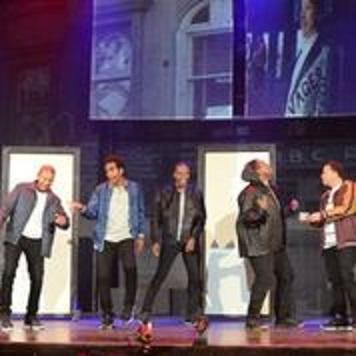Advertisement
Every once in a very long while a work of art comes along that is so well done and important that a critic feels compelled to not only review it, but to champion the piece in the hope that more people will discover and experience it. Such is the case for this reviewer regarding Long Beach Opera’s The Central Park Five, composed by Anthony Davis and libretto by playwright and screenwriter Richard Wesley. The LBO-commissioned opera has world premiered during the 30th anniversary of this tragic miscarriage of justice, when five Black and brown teens were wrongfully convicted of the brutal beating and rape of a white jogger in 1989.
In the interests of full disclosure I should reveal that I met four of the real life Central Park Five in 2012, when they accompanied filmmaker Ken Burns to L.A. for the screening and promotion during AFI FEST of the PBS documentary about them Burns co-directed, also entitled The Central Park Five. I got the opportunity to socialize with the four young men, attending a party for them during the New Yorkers’ visit to L.A. I confess to being favorably impressed by the quartet who, despite being the guests of honor at a Tinseltown reception thrown for them, comported themselves like gentlemen who didn’t seem to “go Hollywood.” (Ava DuVernay also recently released the film When They See Us about the five on Netflix.)
Having said this, Davis and Wesley’s The Central Park Five is a case study in great political art. It belongs in the ranks of outstanding politically inspired creative works such as Pablo Picasso’s antiwar, antifascist mural Guernica. However, since Five is a live stage production with music and actors, it may be closer in comparison to the 2010 Broadway musical The Scottsboro Boys, co-created by John Kander and Fred Ebb (the same team that gave us that anti-Nazi classic Cabaret). And like Scottsboro, Five is based on an actual case about young nonwhite males falsely accused of raping white females and imprisoned and threatened with the death penalty for crimes they did not commit.
Davis and Wesley’s two-act opera opens with a quote from Donald Trump (tenor Thomas Segen, adorned with the obligatory oversized red tie), who decades before he led the charge to delegitimize America’s first Black president with the bogus “birther” movement, cut his reptilian teeth on racist demagoguery with Trump’s vicious vitriol demanding the death sentence for the under-aged suspects shortly after they were charged with raping and savagely beating 28-year-old Trisha Meili on April 19, 1989.
Harlem residents Antron McCray (bass-baritone Derrell Acon), Yusef Salaam (bass-baritone Cedric Berry), Raymond Santana (tenor Orson Van Gay), Korey Wise (tenor Nathan Granner) and Kevin Richardson (tenor Bernard Holcomb) were rounded up shortly after assaults on around eight bikers and other (presumably white) people in Manhattan’s Central Park, of whom Meili - who was discovered bound, gagged, nude and close to death in the North Woods - was by far the most injured. The opera dramatizes how the Harlem quintet, who ranged in age from 14 to 16, were subjected to high pressure, deceptive interrogation by NYPD (Zeffin Quinn Hollis as The Masque) and a District Attorney (mezzo-soprano Jessica Mamey) at the police station, resulting in confessions coerced by New York’s “finest.”
The Harlemites were swept up in the racially-charged fervor of the day, condemned by much of the mass media as a “wolf pack” barbarically carrying out “wilding” in the woods. The opera excoriates the duplicitous role of racist reporters. As Ken Burns noted in the 2012 round robin interview (see: https://www.rockcellarmagazine.com/ken-burns-the-interview/) I was part of: “It’s in the language of a liberal, progressive city in the late 20th century, the language of the ‘wolf pack’ and ‘wilding’ is the language of the Jim Crow South.”
In addition to being a young white woman allegedly raped by nonwhite males - America’s archetypal anxiety about interracial rape perpetrated against Caucasian females was vividly depicted in the 1915 epic The Birth of a Nation as triggering the creation of the Ku Klux Klan - Meili had attended Yale and was a vice president of the Salomon Brothers investment bank. This lent the tragedy a class component, a clash between the haves and have-nots, who have to be “kept in their place.” (The brain traumatized Meili’s memory of the melee vanished according to the opera, wherein she is not depicted as a character per se, although there is a projection onstage of what presumably is a photo of her during the trial sequence.)
Inciting the racist hysteria was the tabloid tycoon Trump, who’d inherited a fortune from his father and was the subject of much press notoriety. According to USA Today, less than two weeks after Meili’s life-threatening assault, Trump spent “$85,000 on full-page ads in four city newspapers, calling for their executions… ’BRING BACK THE DEATH PENALTY. BRING BACK OUR POLICE,’ read the alarming ads, which Trump accompanied with a first-person article. ‘I want to hate these murderers and I always will. I am not looking to psychoanalyze or understand them, I am looking to punish them,’ ” Trump (or a ghostwriter) wrote, sounding precisely like someone desperately in need of psychoanalysis. The New York Times’ review of the June 15 premiere observed: “sung by a high tenor, the stereotype of operatic arrogance, Mr. Trump (Thomas Segen) is portrayed as a sour blowhard.”
Trump returns in Act II ensconced upon his golden toilet, undies rolled down to his ankles although still wearing his overly long red trademark tie, as he berates either law enforcers or journos on the phone to be tougher on the five minors. The scene is very funny, but although the ruthless real estate mogul did stir things up during the brouhaha, it seems that the composer and librettist have taken artistic liberties in making Trump a more central figure in the Central Park jogger case. As the New York Times noted: “His part in the story has been expanded beyond the historical record, to the point that he is seen acting as a kind of Svengali to the police and prosecutors working on the case.”
Be that as it may, during the second act we see that - as with everything else - Trump was dead wrong about the Central Park Five’s guilt. Prison inmate and serial rapist Matias Reyes (Nigerian-American baritone Babatunde Akinboboye, who has multiple roles in the opera) confesses to assaulting Meili. DNA evidence plus his knowledge of the crime scene and events proves he is guilty. Nevertheless, Trump and the authorities remain in denial and refuse to accept reality, even after the court completely exonerates the wronged Harlem lads after they’ve served years behind bars. (At least one of the teens, who was 16 at the time of the attack, was sentenced as an adult to a lengthy prison term.)
The Central Park Five were awarded a $41 million settlement by N.Y. City, which Trump called “a disgrace” in an op-ed for the New York Daily News on June 21, 2014, adding: “These young men do not exactly have the pasts of angels.” Well, even if it’s true that these 14 to 16 year olds weren’t “angels,” they weren’t devils either. Although this didn’t stop a criminal injustice system egged on by Trump from dragging these innocent boys through hell.
Despite the fact that the young men were cleared and finally collected their multi-million dollar settlement from the City (each received approximately $1 million per each year they were imprisoned), the opera does not end on an “and they lived happily ever after” note. Not only is the harsh toll that the ordeal and incarceration exacted upon the quintet dramatized, but the ongoing specter of police excessive use of force and shootings of unarmed Blacks and the lack of accountability for officers is raised. (Incredibly, a young African American couple in Phoenix and their little children were just subjected to what could be a called a “police wilding.” Don’t get me started!)
Although all of the dialogue is sung (as opposed to being spoken) in this “Black Lives Matter” themed opera, it's music isn’t classical in the European sense, but rather jazzy, and sounds similar to Leonard Bernstein’s "West Side Story" score. The 17 piece orchestra was conducted by Leslie Dunner. To express the disconcerting content Davis’ score is often dissonant, in order to communicate a sense of discord, division and turbulence. Call it “dis-chord.”
The members of the quintet are not sharply identified individually and seem and sing like a sort of Greek chorus. The opera’s real standout is mezzo-soprano Lindsay Patterson, who poignantly portrays (among other parts) Yusef’s loving mother, who never doubted and gave up on her wronged son. What a great mom this champion of her child - and people - is! The opera is sung in English and accompanied by English language supertitles.
The composer has also created political operas about Malcolm X, the mutiny aboard the slave ship Amistad and Patty Hearst. Librettist Richard Wesley, who like Davis is African American, wrote the screenplays for 1974’s Uptown Saturday Night, 1984’s Native Son and 1997’s Mandela and De Klerk.
The multi-media The Central Park Five, which includes numerous projections, is directed by Andreas Mitisek, who is also the opera’s production and video designer, as well as LBO’s Artistic and General Director. Mitisek previously directed another one of the topical, controversial operas Long Beach Opera boldly presents, The Death of Klinghoffer. Other socially conscious operas LBO has mounted include the bio-ops Frida by Robert Xavier Rodríguez and composer Philip Glass and librettist Rudolph Wurlitzer’s The Perfect American, a highly critical look at the beloved Walt Disney.
The Central Park Five is a state of the art exemplar of political art currently premiering at San Pedro's nearly-sold out 1,000 seat Warner Grand Theatre, a movie palace built in 1931 (look for the vintage posters of Warner Bros. films in the bathroom lobby). It is a must see by fans of opera - and of social justice, and deserves to be presented at top opera houses and other venues around the world. BRAVO!
Long Beach Opera presents the world premiere of The Central Park Five June 22 at 7:30 p.m. and June 23 at 2:30 p.m. at the Warner Grand Theatre, 478 W. 6th Street, San Pedro, CA 90731. For more info: (562)470-7464; https://www.LongBeachOpera.org/Tickets/.
The third edition of “The Hawaii Movie and Television Book” co-authored by L.A.-based reviewer Ed Rampell is available at: https://mutualpublishing.com/product/the-hawaii-movie-and-television-book/


